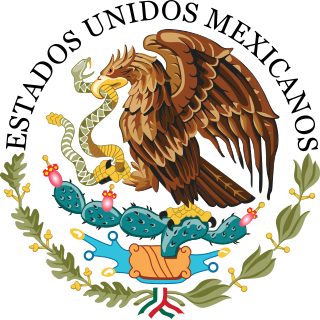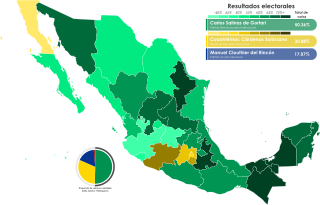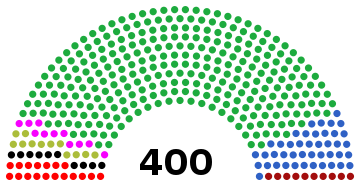
The politics of Mexico function within the framework of a federal presidential representative democratic republic whose government is based on a multi-party congressional system, where the President of Mexico is both head of state and head of government. The federal government represents the United Mexican States. It is divided into three branches: executive, legislative, and judicial, established by the Political Constitution of the United Mexican States, published in 1917. The constituent states of the federation must also have a republican government based on a congressional system established by their respective constitutions.

The Institutional Revolutionary Party is a political party in Mexico that was founded in 1929 as the National Revolutionary Party, then as the Party of the Mexican Revolution and finally as the PRI beginning in 1946. The party held uninterrupted power in the country and controlled the presidency twice: the first one was for 71 years, from 1929 to 2000, the second was for six years, from 2012 to 2018.

The Party of the Democratic Revolution is a state-level social democratic political party in Mexico. The PRD originated from the Democratic Current, a political faction formed in 1986 from the Institutional Revolutionary Party (PRI). The PRD was formed after the contested general election in 1988, which the PRD's immediate predecessor, the National Democratic Front, believed was rigged by the PRI. This sparked a movement away from the PRI's authoritarian rule.

General elections were held in Mexico on Sunday, 2 July 2000. Voters went to the polls to elect a new president to serve a single six-year term, replacing President Ernesto Zedillo Ponce de León, who was ineligible for re-election under the 1917 Constitution. The election system ran under plurality voting; 500 members of the Chamber of Deputies for three-year terms and 128 members of the Senate for six-year terms.

The People's Party is a Panamanian Christian democratic political party. Founded in 1956, it was made up of middle-class professionals, intellectuals and students, with support from trade unions, particularly the Federation of Christian Workers. It went on to become one of Latin America's most conservative and anti-communist Christian democratic parties. The ideological foundation of the party is based on the social doctrine of the Catholic Church. The PP is a full member of the Christian Democrat International and Christian Democratic Organization of America.

The Labor Party is a political party in Mexico. It was founded on 8 December 1990. The party is currently led by Alberto Anaya.

The Christian Democratic Party is a Salvadoran political party. From 2011 to 2012, the party was renamed to Party of Hope before reverting to the Christian Democratic Party. The PDC has been led by Reinaldo Carballo since 2023.

The 1977 Spanish general election was held on Wednesday, 15 June 1977, to elect the Spanish Cortes of the Kingdom of Spain. All 350 seats in the Congress of Deputies were up for election, as well as all 207 seats in the Senate.

The Mexican Democratic Party was a Catholic social conservative political party in Mexico that existed between 1979 and 1997. At its height in 1982, the party had over 500,000 active voters and 12 seats in the Mexican Chamber of Deputies.

General elections were held in Italy on 5 and 6 April 1992. They were the first without the traditionally second most important political force in Italian politics, the Italian Communist Party (PCI), which had been disbanded in 1991. Most of its members split between the more democratic socialist-oriented Democratic Party of the Left (PDS), while a minority who did not want to renounce the communist tradition became the Communist Refoundation Party (PRC); between them, they gained around 4% less than what the already declining PCI had obtained in the 1987 Italian general election, despite PRC absorbing the disbanded Proletarian Democracy (DP).

General elections were held in Mexico on 6 July 1988. They were the first competitive presidential elections in Mexico since the Institutional Revolutionary Party (PRI) took power in 1929. The elections were widely considered to have been fraudulent, with the PRI resorting to electoral tampering to remain in power.

Legislative elections were held in Mexico on 18 August 1991, alongside gubernatorial elections in six states. The Institutional Revolutionary Party (PRI) won 320 of the 500 seats in the Chamber of Deputies and 31 of the 32 seats up for election in the Senate. Voter turnout was 61% in the Chamber election and 62% in the Senate election.

Legislative elections were held in Mexico on 6 July 2003. Although the National Action Party received the most votes, the Institutional Revolutionary Party won 224 of the 500 seats. Voter turnout was only 41%.

Parliamentary elections were held in Hungary on 25 March 1990, with a second round of voting taking place in all but five single member constituencies on 8 April. They were the first completely free and competitive elections to be held in the country since 1945, and only the second completely free elections with universal suffrage in the country's history. The conservative, nationalist Hungarian Democratic Forum (MDF) beat the liberal and more internationalist Alliance of Free Democrats, which had spearheaded opposition to Communist rule in 1989, to become the largest party in parliament. The Hungarian Socialist Party, the former Communist party, suffered a crushing defeat, winning only 33 seats for fourth place.
A bloc party, sometimes called a satellite party, is a political party that is a constituent member of an electoral bloc. However, the term also has a more specific meaning, referring to non-ruling but legal political parties in a one-party state although such minor parties rarely if ever constitute opposition parties or alternative sources of power. Other authoritarian regimes may also have multiple political parties which are nominally independent in order to give the appearance of political pluralism, but support or act in de facto cooperation with the government or ruling party.

General elections were held in Mexico on 4 July 1982. The presidential elections were won by Miguel de la Madrid, who received 74% of the vote. In the Chamber of Deputies election, the Institutional Revolutionary Party (PRI) won 299 of the 372 seats, as well as winning 63 of the 64 seats in the Senate election. Voter turnout was 75% in the presidential election and 73% and 66% for the two parts of the Chamber elections.

General elections were held in Mexico on 4 July 1976. José López Portillo was the only candidate in the presidential election, and was elected unopposed. In the Chamber of Deputies election, the Institutional Revolutionary Party (PRI) won 195 of the 237 seats, as well as winning 64 seats in the Senate election. Voter turnout was 65% in the Senate election and 62% in the Chamber election.
The L Legislature of the Congress of the Union met from 1976 to 1979. This 50th session of Congress consisted of senators and deputies who were members of their respective chambers. They began their duties on September 1, 1976, and ended on August 31, 1979.

Democracy in Mexico dates to the establishment of the federal republic of Mexico in 1824. After a long history under the Spanish Empire (1521–1821), Mexico gained its independence in 1821 and became the First Mexican Empire led by royalist military officer Agustín de Iturbide. Three years later, a federal republic was created under the Constitution of 1824. However, the republic was truncated by a series of military coups, most notably that of politician-general Antonio López de Santa Anna. Santa Anna held immense sway over the fledgling Mexican democracy until 1855, when he was ousted by liberal politicians.

The Workers' Socialist Party was a socialist political party in Mexico. The PST was founded in 1975 by Rafael Aguilar Talamantes, Graco Ramírez and Juan Ignacio del Valle, though the party did not obtain its official registration until 1979. The party nominated Cándido Díaz Cerecedo in the 1982 presidential election.

















